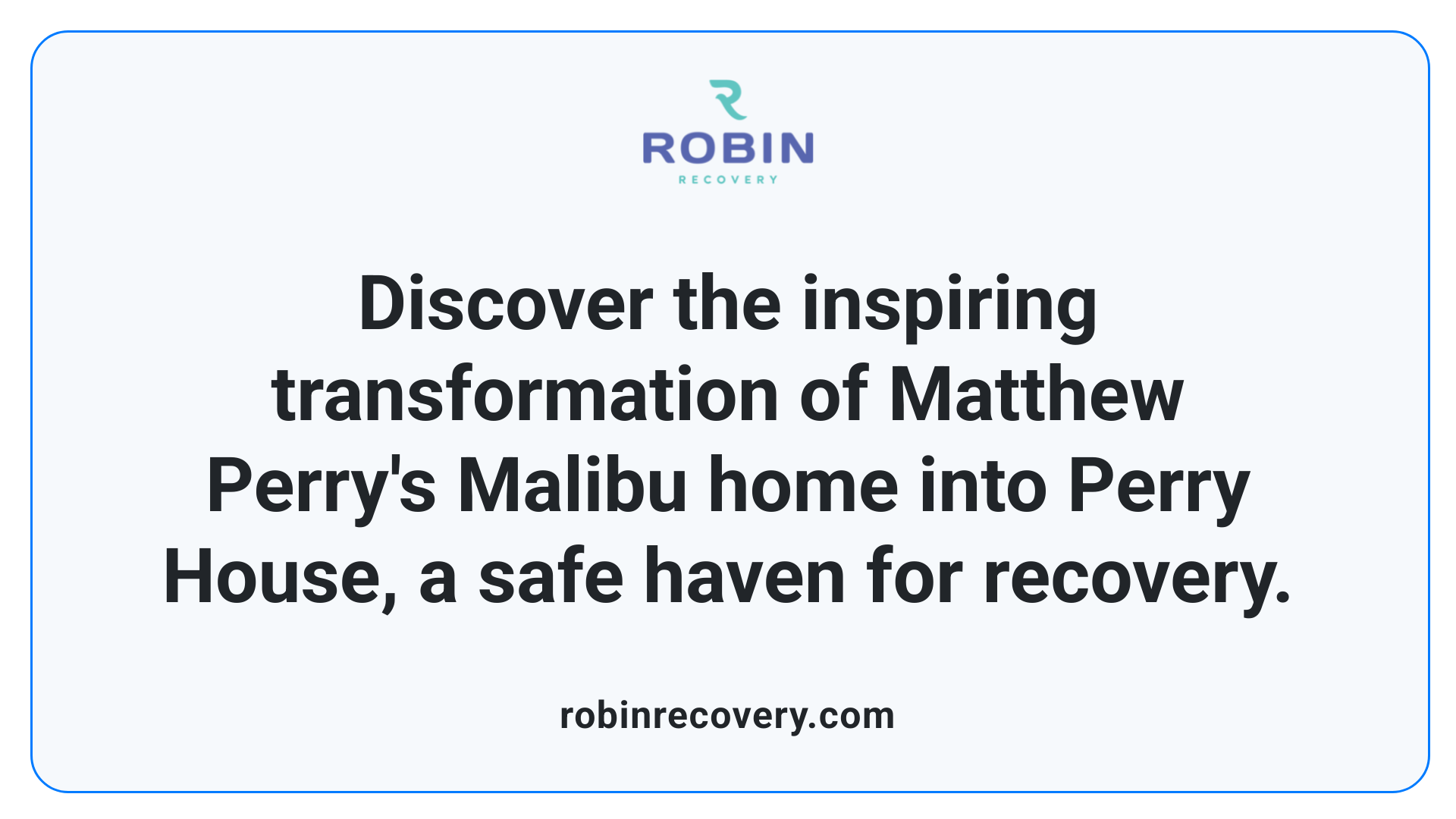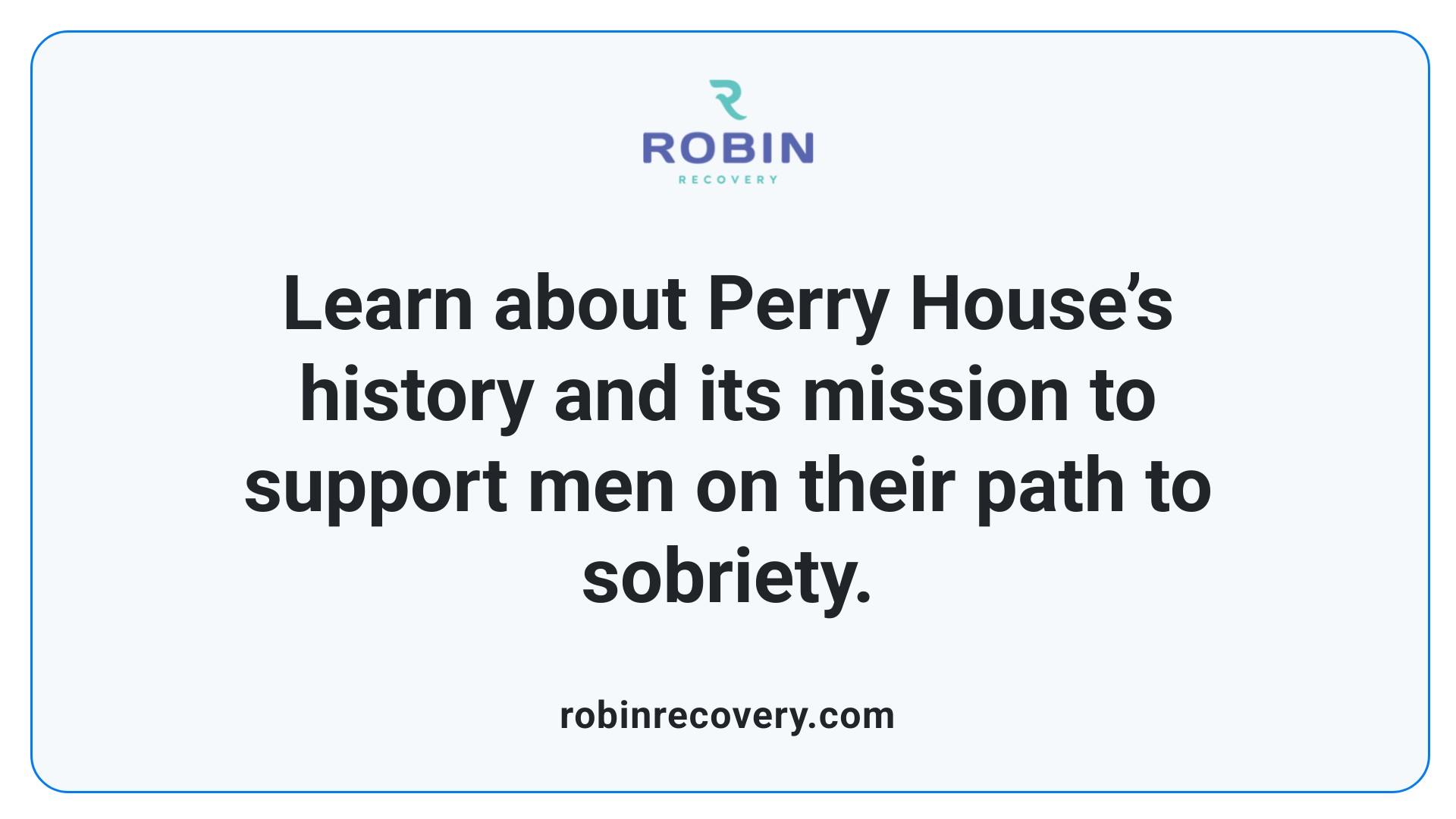Matthew Perry Converts His Malibu Home Into a Sober Living Center for Men

A Personal Mission to Aid Others in Sobriety
Famed actor Matthew Perry, best known for his iconic role on 'Friends,' has channeled his lifelong battles with addiction into a mission to help others. His recent transformation of his Malibu home into a sober living facility underscores his commitment to supporting men on their journey to sobriety, further solidifying his legacy as an advocate for addiction recovery.
The Transformation of Perry’s Malibu Residence into Perry House

Has Matthew Perry's house been converted into a sober living facility?
Yes, Matthew Perry's former Malibu house has been transformed into a men's sober living home called Perry House. Perry personally led the renovation process, converting his beachfront property into a supportive environment tailored for individuals seeking recovery from addiction. The facility was designed to provide a holistic and structured setting, promoting sobriety through various amenities, rules, and professional support.
Perry worked closely with addiction specialists to ensure the house met the needs of men transitioning out of inpatient rehab. The goal was to create a haven that fostered community, responsibility, and ongoing recovery. Perry operated Perry House from 2013 until 2015, after which he sold the property. Despite the sale, his commitment to supporting those facing similar struggles remains a notable part of his legacy, highlighting his personal dedication to helping others achieve sobriety.
What are details of Matthew Perry's sobriety and recovery journey?
Matthew Perry’s journey with addiction was long and public. He battled alcohol and pill dependency for over a decade, which significantly impacted his life and career. Perry opened up about his struggles, sharing that he finally achieved sobriety after years of difficult battles. He was reportedly sober for 19 months prior to his passing, demonstrating his ongoing commitment to recovery.
In his later years, Perry sought innovative treatments such as ketamine infusion therapy to manage depression and anxiety, which he believed supported his sobriety. His stepfather remarked that Perry was in a good place, happy and peaceful. Unfortunately, Perry’s passing was ruled accidental, linked to ketamine use, with additional factors like buprenorphine, coronary artery disease, and drowning cited in autopsy reports. Perry’s openness about his struggles and his efforts to help others through initiatives like Perry House underscore his dedication to supporting recovery.
Who owns Matthew Perry's house now?
As of October 2023, Matthew Perry's Malibu home is owned by entrepreneur Anita Verma-Lallian. She purchased the residence for $8.55 million through an off-market deal. Verma-Lallian, of Indian descent, is known for her work as a real estate developer and her admiration for the property.
After acquiring the house, Verma-Lallian performed a Hindu blessing ceremony, honoring her cultural traditions. She also plans to redesign the house while respecting Perry’s legacy, including leaving a notable Batman logo in the pool as a nod to Perry’s well-known role as Chandler in 'Friends.' Her purchase was driven by her appreciation of the property's unique features, rather than any personal connection to Perry. She aims to maintain the house’s distinctive character while making it her own.
Matthew Perry’s Personal Struggles and Advocacy for Sobriety

What are details of Matthew Perry's sobriety and recovery journey?
Matthew Perry's battle with addiction was long and public. He faced struggles with alcohol and prescription drugs, notably opioids, starting from his teenage years. His journey to sobriety involved numerous efforts, including over 15 rehab stays and attending approximately 6,000 Alcoholics Anonymous meetings. Perry was transparent about his difficulties, sharing that he was sober for about 19 months before his passing. He also explored innovative treatments like ketamine infusion therapy, which he credited with helping him manage depression and anxiety, ultimately aiding his sobriety. His final moments showed him in a good place emotionally, according to family sources, and his death was ruled an accidental overdose involving ketamine, buprenorphine, and other health issues.
How much did Matthew Perry pay to get sober?
Achieving sobriety was a costly pursuit for Matthew Perry. Over the years, he estimates spending between $7 million and $9 million on his efforts to recover. His financial commitment included multiple stays in rehab facilities, with at least 15 known treatments, highlighting the financial toll of his addiction battle. Perry's dedication was driven by a lifelong struggle with substance use, which started at age 14. Despite the substantial costs, Perry's investment underscores his resolve to overcome his dependency and the intense personal and financial effort he devoted to this goal.
What is known about Matthew Perry's efforts to support substance abuse recovery?
Beyond his personal struggles, Perry actively contributed to the community by advocating for recovery. He openly discussed his addiction history, emphasizing the importance of persistent treatment and support. Perry founded Perry House, a sober living residence in Malibu designed to help men transition from inpatient rehab to independent living. This facility provided a drug-free environment, structured routines, peer support, and professional guidance, especially during the critical 60 days after inpatient treatment.
Perry’s advocacy earned him notable recognition, including the Champion of Recovery Award from the Office of National Drug Control Policy and the Phoenix Rising Award. He believed in the value of treatment programs and public awareness, planning to establish a foundation dedicated to supporting individuals fighting addiction. His efforts to give back were motivated by his own experiences and a desire to help others turn their lives around.
Additional support initiatives and community impact
In addition to Perry House, Perry’s public advocacy included supporting drug courts, which favor treatment over incarceration for non-violent offenders with addiction issues. His story and work serve as a testament to the possibility of recovery and the importance of ongoing support. Perry’s life exemplifies that with perseverance and support, individuals can overcome even long-standing addiction, and his legacy continues through the initiatives he championed.
Aspect Details Additional Info Personal struggles Alcohol and opiates since teenage years, multiple relapses, long battle with addiction Openly shared his story, used fame to inspire others Recovery efforts Over 15 rehab stays, thousands of AA meetings, ketamine therapy, extensive financial costs Estimated $7-9 million spent Community contributions Founded Perry House, supports drug courts, advocacy, planned foundation Recognized with awards for recovery support Final days and passing Sober for 19 months at time of death, died from accidental overdose involving ketamine Autopsy also noted other contributing health conditions
Matthew Perry’s story reminds us of the complexities of addiction and the power of resilience. His dedicated efforts to support others continue to inspire those on the path to recovery.
Perry House: A Foundation of Support and Hope

What is the history of Perry House operation?
Perry House was originally established by Matthew Perry in Malibu, transforming his former beachfront home into a sober living residence for men recovering from addiction. The facility, known as Perry House, was active from 2013 until 2015. During those years, it provided a structured, drug-free environment aimed at supporting men during the critical first 60 days after inpatient treatment. Perry collaborated with addiction specialists to create a safe space that emphasized peer support, accountability, and personal growth.
The house was designed to foster a community where residents could regain stability and work toward long-term sobriety. It featured rules such as abstinence from drugs and alcohol, curfews, and participation in support groups. Perry’s commitment to helping others in recovery was driven by his own struggles with addiction during the 1990s, and he used his experience to inspire and guide those in the program.
After operating for two years, Perry sold the property in 2015. Though he stepped away from direct management, the legacy of Perry House continues to influence perceptions of supportive recovery spaces in Malibu.
What is Matthew Perry’s involvement and vision for the facility?
Matthew Perry’s journey with addiction and recovery profoundly shaped his vision for Perry House. As someone who battled alcohol and opiate dependence for over a decade, Perry dedicated himself to creating a supportive environment that could help others avoid the pitfalls he faced.
His active participation was evident in his personal investment—converting his Malibu home into a sober living facility and working with medical and addiction professionals to tailor the program to meet residents' needs. Perry believed strongly in community-based recovery, emphasizing peer support, routine, and accountability.
Perry’s ongoing advocacy extended beyond Perry House. He supported drug courts and publicly shared his struggles to reduce stigma around addiction. His goal was not only to help individuals achieve sobriety but also to foster a culture of understanding and compassion.
Although Perry sold the Malibu property in 2015, his work laid the foundation for future recovery initiatives, and his influence remains evident in the broader conversation about addiction treatment.
How has Perry House impacted the local community?
When Perry House was operational, it became an integral part of Malibu’s recovery landscape. The residence offered hope and practical support to men working to rebuild their lives. The community appreciated the structured approach and the emphasis on holistic well-being.
Local residents and addiction experts recognized Perry House as a positive force, supporting Perry’s belief that recovery communities can contribute to the greater good. The facility also drew attention to Malibu as a place committed to health and recovery, encouraging more initiatives aligned with Perry’s vision.
Additionally, Perry House’s recognition through awards such as the Champion of Recovery from the Office of National Drug Control Policy highlighted the impact of Perry’s efforts on national levels. His work helped promote innovative recovery models and underscored Malibu’s reputation as a caring community dedicated to healing.
Aspect Details Additional Information Location Malibu Beachfront, scenic setting conducive to recovery Operation Years 2013-2015 Ran as a dedicated sober living home for men Founder Matthew Perry Actor and addiction recovery advocate Core Values Support, accountability, community Emphasizes peer support, structure, and ongoing guidance Recognition Champion of Recovery Award Awarded by the Office of National Drug Control Policy
The Broader Context of Perry’s Advocacy and Public Support
What efforts has Matthew Perry made to promote recovery and mental health awareness?
Matthew Perry has been a vocal supporter of mental health and addiction recovery initiatives. His own journey through addiction and eventual sobriety gave him a platform to advocate for change. Perry openly shared his struggles, destigmatizing issues related to substance abuse and mental health.
He supported the implementation of drug courts, which favor treatment over incarceration for non-violent offenders with substance abuse problems. This approach promotes healing and reduces recidivism, emphasizing the importance of ongoing support and treatment.
Beyond his personal stories, Perry actively participated in community programs and initiatives designed to foster awareness and policy change. His efforts aimed to encourage a more compassionate societal attitude towards addiction, emphasizing recovery, support, and mental health care.
His journey to sobriety and recovery details
Perry battled with alcohol and opiate addiction for over a decade, often in and out of rehab. He finally achieved sobriety after a long, arduous fight, spending an estimated $7 to $9 million on various rehab programs, including 15 visits to treatment facilities. His commitment was driven by a desire to regain control of his life and to overcome his dependency issues.
He was reportedly clean for 19 months before his death. During his recovery, Perry explored innovative therapies such as ketamine infusion treatment for depression and anxiety, which he believed helped him stay sober and manage mental health challenges.
His stepfather remarked that Perry was in a good place and felt genuinely happy shortly before he passed away. Perry’s dedication to sobriety was both personal and public, as he consistently shared his story to inspire others.
How much did Matthew Perry pay to get sober?
The financial aspect of Perry’s path to sobriety was significant. He spent roughly $7 to $9 million on his recovery journey, with approximately $7 million allocated to 15 different rehab programs. His expenses reflected the extensive measures needed to combat his long-standing addiction issues.
Perry’s investments in treatment underscore the serious commitment required to overcome substance dependency, highlighting the costs—both personal and financial—that often accompany such struggles.
Broader support for addiction recovery and mental health
In addition to his advocacy, Perry received recognition for his efforts. Along with Earl Hightower, he was awarded the Champion of Recovery Award from the Office of National Drug Control Policy. This accolade acknowledged his ongoing support for recovery initiatives and his contribution to community service.
Through his actions and public openness, Perry sought to break down stigma and promote accessible, compassionate solutions for those battling addiction. His life and work continue to inspire efforts to improve mental health awareness and addiction treatment policies.
Aspect Details Additional Notes Support Programs Advocacy for drug courts, treatment over incarceration Aims to foster healing and reduce repeat offenses Personal Journey Long-term addiction, extensive rehab efforts Costly and challenging but ultimately successful in sobriety Recognition Champion of Recovery Award Shared with Earl Hightower, highlighting community support Public Impact Destigmatizing mental health and addiction Inspiring others through openness and advocacy
This comprehensive focus on Perry’s efforts emphasizes his commitment to fostering a better understanding of addiction and supporting recovery initiatives.
Legacy of Compassion and Support
Matthew Perry's journey from grappling with addiction to becoming a beacon of hope and support in the recovery community exemplifies resilience and altruism. His transformation of his Malibu residence into Perry House provided a tangible sanctuary for men seeking sobriety, reflecting his lifelong dedication to helping others. Although Perry has passed, his legacy endures through the ongoing initiatives inspired by his efforts and the compassion he championed, inspiring many to confront their struggles and embrace recovery.
References
- Matthew Perry's Malibu Home - Northstar Behavioral Health
- Matthew Perry Converts His Malibu Home into a Sober Living ...
- Matthew Perry's Journey to Recovery | Jacksonville FL Rehab
- Matthew Perry Planned to Launch Substance Abuse Foundation
- Matthew Perry Talks Addiction and Helping Others at the Perry House
- Matthew Perry Turns His Oceanfront House Into Rehab Residence
- Matthew Perry 'felt like he was beating' his addiction issues ... - BBC
- US & Canada | Latest News & Updates - BBC
